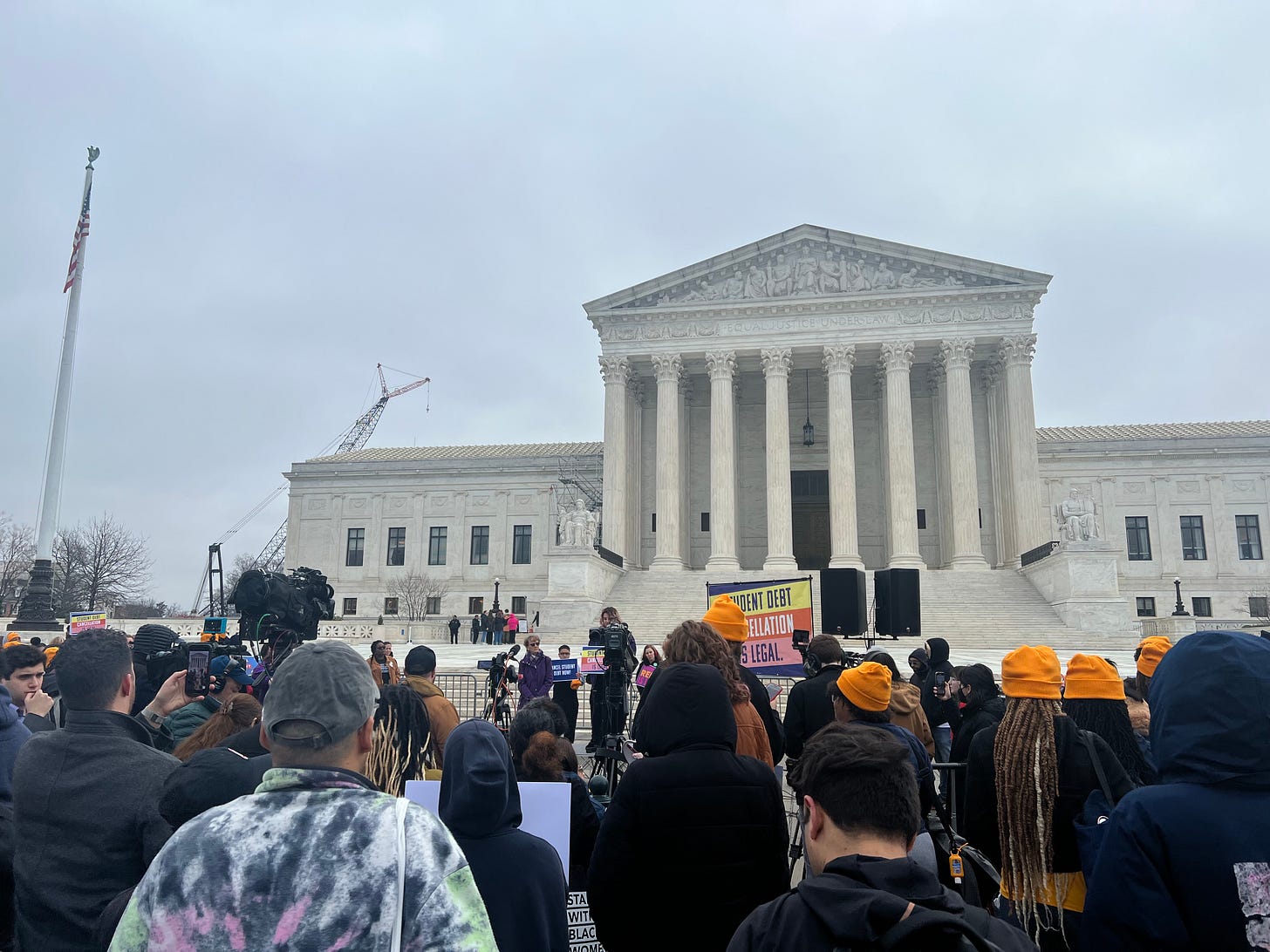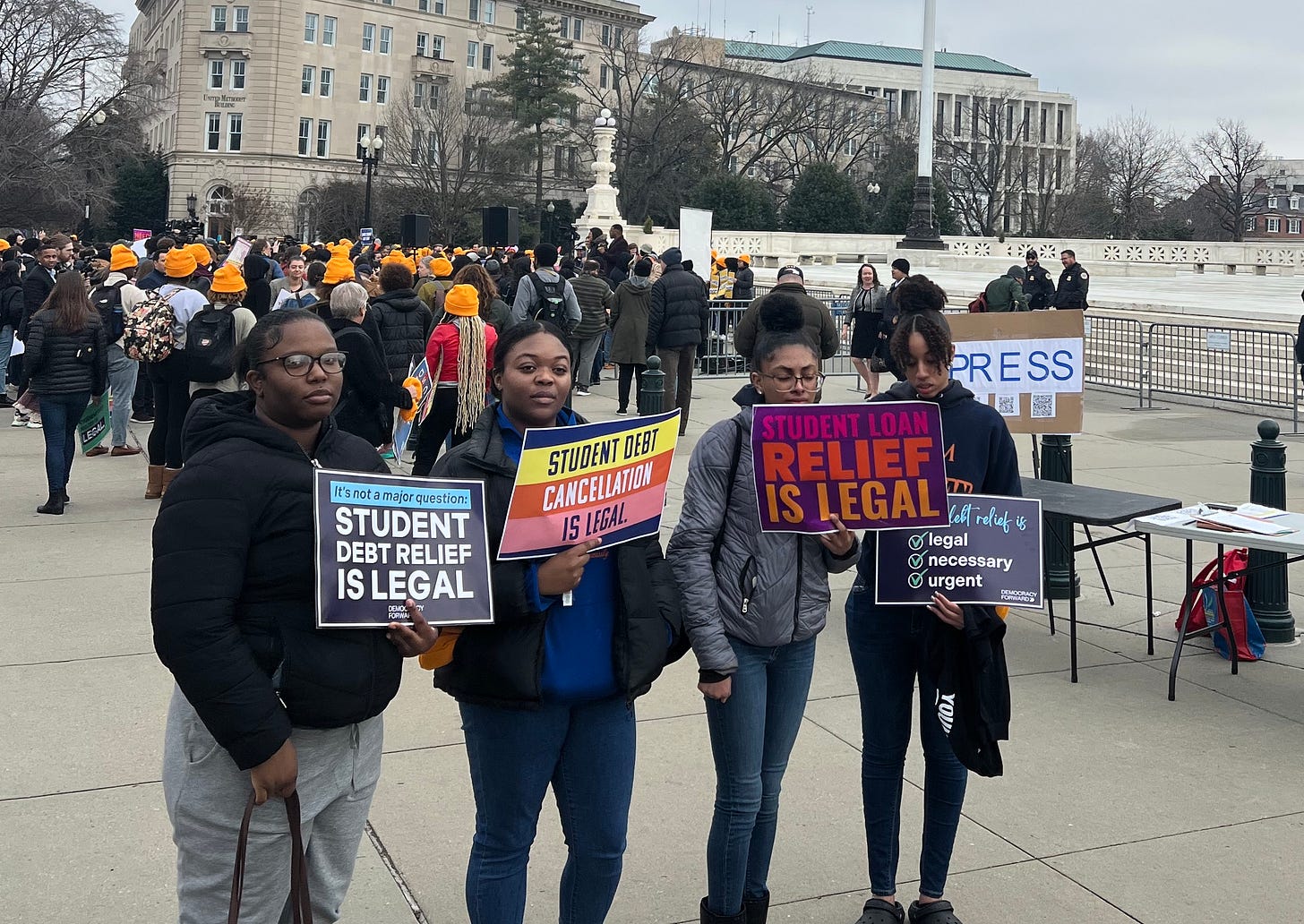Black women rally at Supreme Court for student debt relief
Black women hold more student loan debt than any other group — and stand to benefit most from President Joe Biden’s student debt cancellation program.
When Rep. Ayanna Pressley took the stage to speak to protesters in front of the Supreme Court Tuesday, the Boston congresswoman told a story that may sound familiar to many borrowers across the country.
“I woke up thinking about the grandmother who held onto my shoulders as she whispered her fear that she would be paying student loans until she died,” Pressley said as she told the crowd about her 76-year-old constituent. “76 years old and owes more than she took out. Living on a fixed income, benefits garnished, because of student debt she still owes.”
A few hundred protesters listened to her speech as they rallied outside the Supreme Court for the People's Rally for Student Debt Cancellation. Inside the court, justices heard arguments challenging President Joe Biden’s student debt cancellation program. Federal student loan borrowers who received Pell Grants would be eligible for up to $20,000 in debt forgiveness if the plan is allowed to go forward.
The Supreme Court is expected to issue its decision at the end of the current term sometime this summer.
Pressley herself is no stranger to the challenges that come with crushing student loan debt. Her own student loans went into default, leading to “years of financial distress.”
While the audience was diverse, reflecting how the fight for student relief cuts across races and communities, Black women were prevalent at the protest. They bussed together from North Carolina, others drove in from Ohio, and a number flew in from other states to ensure their voices were heard.
“I worked at [my school’s] Women’s Center, and I learned a lot about how student loan debt affects Black women and how we carry most of the burden,” said Deandra Wright, a sophomore at Ohio’s Kent State University. “Knowing there is a wealth gap, it’s going to be harder for me to pay the loans off. It makes it hard to get an upper hand.”
According to the nonprofit The Education Trust, Black borrowers are disproportionately burdened by student loan debt, but Black women in particular hold more of the debt than any other group — while simultaneously being the most college-educated group in the nation. Black women average $38,800 in federal undergraduate loans.
“Because Black women exist at the intersection of two marginalized identities and experience sexism and racism at the same time, they make less money and often need to borrow more to cover the cost of attendance, and struggle significantly with repayment,” the report read.
That statistic surprised Jasmine Jones-Howard, who said she was unaware that Black women were saddled with so much student loan debt.
“I didn't even know that student debt affected black women the most, but I have a lot of debt myself,” said Jones-Howard, a graduating senior majoring in psychology at Baltimore’s Morgan State University. “I’m pretty much in college on all student loans because coming out of high school, I didn't have the best grades, so I had to apply for loans to get through school.”
She wants to continue on to graduate school, but is worried about the amount of student loans she’ll have to take out on top of what she already owes.
For some Black women, the pressure of student debt is actively preventing them from making career choices that could benefit society. Law students who want to give back are faced with the dilemma of being unable to repay their loans because of the low salaries associated with certain career paths, such as public defender service or nonprofit work.
“A lot of Black women or Black people in the legal field are kind of forced to work for firms in corporations because we can't afford not to,” said Jasmine Marchbanks-Owens, a Howard University law student.
“It's almost a privilege to be able to work with the community to do civil rights work because that work does not pay, and it doesn't really help us to be able to pay off our debt. So now we have to decide between these moral issues of ‘I want to help my community, but I also need to make sure I have money to survive,’” she explained.
Kristin McGuire, the executive director for youth advocacy nonprofit Young Invincibles, called Tuesday’s rally “our Super Bowl.”
“We have created a system where [Black women] go to college and need the most help, end up graduating, enter the workforce, make less money than our counterparts, and owe the most money to finance the education,” she explained. “That's the problem.”





Great article bro!
Not surprised by the things in this article. Hoping that some relief occurs.